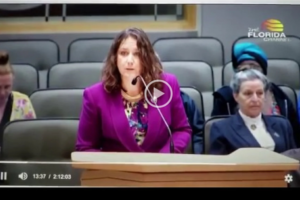Injecting pure THC may cause a bad trip.

Most experienced Cannabis users know that set and setting affect the user’s experience. We tell less experienced friends to start low and go slow. We understand that everything you ingest has an impact on the brain, from sugar to potatoes. We also know that eating potatoes is not the same as drinking vodka, and a vodka screwdriver is not a shot of 180 proof Everclear.
This week in Tallahassee, Florida (February 16, 2021) the Florida House is talking about Marijuana. The new director of the Office of Medical Marijuana Use Chris Ferguson is reporting to the House Professions and Public Health Committee on the status of Florida’s constitutionally mandated medical marijuana program. Since no bill is being heard Tuesday, the public won’t be allowed in the room.
That means only the lawmakers will be in the room when Dr. Bertha Madras gets up to talk about the harms of high potency Cannabis.
Dr. Madras served as Associate Director for Public Education on Addictions at Harvard among other distinguished appointments. She has made her mark on addiction medicine, lecturing, patents on brain imagining used in the diagnosis of mental disorders. Dr. Madras has also written extensively on other people’s research.
With patents in-play, Dr. Madras has a vested interest in cannabis prohibition. Marijuana-use Disorder must remain a problem in need of her treatment solutions. Check out her work at RiverMend Health. Without a steady flow of unfortunate cannabis users being diverted to treatment by the justice system, the model falls apart.
Dr. Madras has been here before. In 2017, Dr. Madras was part of a similar program for the House Health Quality Subcommittee. That more balanced program featured the Office of Medical Marijuana Use Director, Dr. Madras, and famous Cannabis researcher, Dr. Sue Sisely. Dr. Madras starts speaking at about 40 minutes into this presentation archived by the Florida Channel.
Balancing current science, done using reliable, replicable methods, against rhetoric, fraud and special interests is a daily job for everyone. Lawmakers make policies based on the information they have, what they are given, what they learn, and what they are told by their Party leadership.
The Drug-Free America crowd is still alive and well. While we don’t see “This is Your brain on drugs” commercials so much anymore, the Florida-based organization does continue to hire lobbyists, walk the halls, donate to campaigns, and in general, have a great influence on how lawmakers think and talk about Cannabis in Florida.
In 2019, when Drug-Free America, now billed as Save Our Society from Drugs, wanted to ensure that Florida put a10% THC Cap on Cannabis products available in the legal medical marijuana market, they called Dr. Madras to talk about Cannabis and its effects on the brain. They couched the discussion as one about the harms of recreational Cannabis, then introduced a bill that proposed to cap the THC concentration in FLOWER sold for medical marijuana to under 10%. You can listen to the committee hearing yourself here. Dr. Madras is the only speaker. She goes on for 1 hour and 11 minutes about all the reasons you should be scared to let your state go to pot. Then she said it: “I have no Florida-specific data.”
Worse yet, the research she quotes uses injected PURE THC as the control dose. The link between Cannabis use and psychosis she persistently claims is based on the perception of test subjects after being injected with pure THC.
Watch this five-minute YouTube video, and for goodness sake, don’t try this at home.
Once again, Florida is at the tip of the spear. While our lawmakers want to cap the THC in flower products, other states love flower as a safer, more natural product. Washington state loves Cannabis flower use but is entertaining a bill that would cap THC rich concentrates at 30% this year.
This rush to use results from tests given while subjects were under the effects of injected doses of pure THC is dangerous. Public policy is built on the information lawmakers are given. They will use these studies to criminalize certain behavior. Madras mentions driving impairment in her 2019 visit. Marijuana Moment posted this article about the use of injected Cannabis in motor-control studies in 2018. This is the research lawmakers will someday be given to use in creating a legal limit for THC in drivers, perhaps the most unreliable measure of impairment.
Watch for more from Florida CAN as we launch our 21st Century Cannabis Project discussing good science and modern applications for this amazing plant.







Leave a Reply
Your email is safe with us.